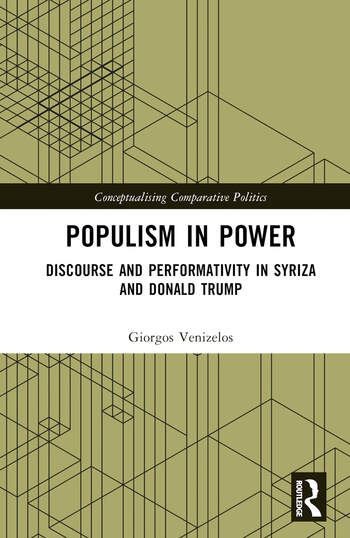Populism in Greece and the USA

Published by: Routledge

Populism is a notoriously contested concept: at its core, most interpretations share the understanding of populism as the antagonistic opposition of “the people” opposing “the elite”. Other than this, interpretations carry different normative implications. Overall, we can divide approaches to populism depending on whether they define populism as a threat or as a possible corrective to liberal democracy. This division leads scholars to engage in an ever-growing number of debates. Among current debates on the topic, the question of populism in power has often found scholars particularly skeptical. Several authors argue that populist actors would be inherently demagogical, unable to effectively achieve their policy objectives and consequently irreconcilable with government. Others affirm that the rise of populism in power would necessarily threaten liberal democracy, leading to illiberal, anti-democratic practices and authoritarian regimes. However, recent years have shown the rapid growth of populist parties across the globe, mobilizing citizenry in protest, becoming electorally successful, and even reaching government in a number of countries. Despite the outcry over the growing populist threat, the rise of populist actors to national government has rarely led to the overthrow of liberal democratic institutions, and most populist parties maintained their populist features regardless of becoming part of the institutions. For this reason, a growing body of studies is currently questioning whether defining populist parties as outsiders to liberal democracy really captures the essence of populism.
Giorgos Venizelos’ first book Populism in Power: Discourse and Performativity in SYRIZA and Donald Trump addresses this debate by analyzing recent populist governing experiences in Greece and the United States. Venizelos criticizes essentialist interpretations of populism and centers his definition of populism on the construction of identities of “the people” and “the elite” through performance and the mobilization of emotions. This anti-essentialist perspective allows Venizelos to identify distinct forms of populism which mobilize different emotions and pursue distinct modes of identification. His argument not only shows that populists can obtain –and remain– in power, but also that threats to liberal democracy derive from ideological stances rather than populism in itself.
Venizelos calls for an alternative conceptualization which focuses on the performative function of populism.
The author’s argument is first presented following a wide literature review on populism in power in Chapter 1. He identifies two branches in the literature on the topic: outcome-oriented and policy-oriented approaches. The review allows the author not only to inspect the inconsistencies in the literature but also to display a widespread anti-populist tendency among scholars invested in the topic. Venizelos calls for an alternative conceptualization which focuses on the performative function of populism. His definition draws from the discursive approach of Laclau, Mouffe, and the Essex school, looking at populism as the articulation of identities based on discursive practices, but which is inscribed in the relational performative approach proposed by Ostiguy and Moffitt, interpreting populism as the enactment of disruptive performances and claims to mobilize audiences towards a political cause.
Chapter 2 introduces the reader to the two cases selected for this book: the rise and government of the radical left-wing party SYRIZA in Greece and the Republican candidacy and presidency of Donald Trump in the United States. The comparison appears counterintuitive at first: the two actors are antithetical ideologically and structurally. However, the selection of most different cases fits Venizelos’ anti-essentialist premise, comparing the actors for their discursive articulation of identities rather than for ideological features that are neither exclusive nor constitutive of populism. Similarly, the selection of cases with such diverse structures proves that populism cannot be restricted to one regime type, but it comes in a variety of shapes and forms.
The following four chapters analyze the two cases in more detail. Chapters 3 and 4 investigate the case of SYRIZA, first in opposition between 2012-2015, and later in government in 2015-2019. Similarly, Chapters 5 and 6 look at Donald Trump’s 2016 political campaign, and his presidential term in 2016-2020. The analysis looks at how the populist actors articulate their people-centric and anti-elitist claims across time, how they define social problems (diagnosis) and solutions (prognosis) in their discourse, and how they develop processes of identification. The four chapters provide thick descriptions of the two cases, using a range of qualitative tools encompassing discourse analysis, visual analysis, interviews with activists, and direct participation.
SYRIZA’s discourse focused more on “hope” and “change” while Trump evoked more “anxiety” and “nostalgia.”
Chapter 7 ultimately delves into the comparative analysis. Venizelos observes several similarities: he argues that both SYRIZA and Trump maintained their populist performativity while in power, although changing their narratives over time, and they both articulated populist and non-populist claims in their discourse. However, the two parties also differed on many aspects: they proposed different articulations of the enemy to the people and evoked different emotions in their audiences, as SYRIZA’s discourse focused more on “hope” and “change” while Trump evoked more “anxiety” and “nostalgia.” Furthermore, although both actors mobilized various groups with different interests, they developed distinct modes of identification in their audiences. Groups supporting SYRIZA developed horizontal solidarity with each other, leading to different audiences mobilizing beyond single issues and supporting each other. Differently, Trump’s audiences developed exclusive vertical identification with the leader and the communities did not relate with each other. Venizelos ends the comparison by showing the different relations between the two actors and democratic institutions: SYRIZA did not pose any significant threat to the liberal democratic institutions, while Trump did attempt to overcome systemic forms of checks and balances. He argues that danger to liberal democracy resides in the ideological dimension of the political actors rather than populism alone, which “does not suffice to explain the type of politics they seek to implement.”
In conclusion, Venizelos presents a compelling argument on the relation between populism and power. His contribution includes in-depth qualitative research of the two specific cases, providing a rich and informative description of both SYRIZA and Donald Trump to the reader. The comparative study inevitably encounters limitations due to the substantial differences between the two country cases, but the author addresses them and produces a valuable cross-regional and cross-ideological study able to put into discussion previous essentialist understanding of this concept. His focus on emotions and identity articulation captures understudied aspects of populism, including multiple and distinct processes of identification between populist actors and their audiences. His approach also provides a significant conceptual contribution to the literature on the relational performative approach to populism, displaying how the study of performance can complement Laclauian theory by providing new, “down-to-earth” tools of analysis to researchers.
Francesco Campo is a PhD fellow at the department of social Science and Business in Roskilde University, Denmark. His works focuses on modes of opposition targeting populist parties by public institutions, political parties and civil society actors. His dissertation examines how opponents to populist parties in Italy and Spain targeted rising successful populist parties between 2013-2021. In 2023, he published his first article in the journal Comparative European Politics, entitled “Differentiated opposition in collective mobilization: Countering Italian populism”.
